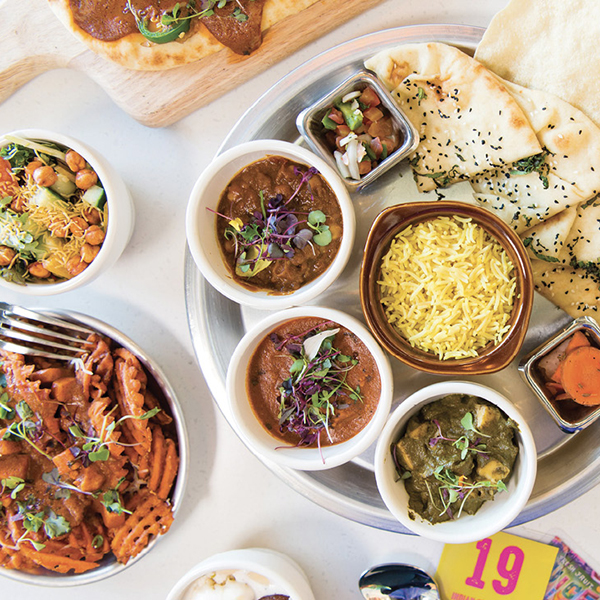Caribbean is the cuisine of the year and Indian is a cuisine on the rise, according to this year’s hospitality industry trends report issued by consulting firm af&co. and communications specialist Carbonate.
The annual report, now in its 14th year, seeks to identify the trends and practices that will shape the hospitality industry in 2022 by identifying key influences in food, beverage, sustainability, and other areas. This year’s report is dubbed “Through The Looking Glass: Finding Your Way In A New Era Of Hospitality.”
“This year was supposed to be a year of recovery, yet it feels like we’ve all gone ‘down the rabbit hole’ and must figure out how to adjust to this strange new world,” said Andrew Freeman, founder of af&co, in a statement. “While the unknown can feel daunting, it also presents opportunities to create a more equitable, efficient, and profitable hospitality industry, and we’ve seen some incredible innovation and progress on these fronts.”
In naming Caribbean the cuisine of the year, the report points to restaurants such as Canje in Austin, Texas, which focuses on Guyanese, Puerto Rican and Jamaican cuisines; West Indian restaurant Kokomo in New York; the Latin-Caribbean restaurant Chao Pescao in San Francisco, and the Afro-Latino restaurant Sobre Mesa in Oakland, California.
Indian food, meanwhile, is enjoying rising popularity as chefs are uncovering local and regional specialties and putting a modern spin on traditional dishes. Examples include Aurum in Los Altos, California, which features “the best of forgotten traditional recipes” from different regions of India, using local California produce; Unapologetic Foods in New York, which operates several restaurants showcasing regional Indian cuisine, and Amber India, with multiple restaurants in the San Francisco Bay Area.
Other culinary trends cited in the report include:
• The increasing popularity of empanadas, which include flaky pastry-wrapped items from Argentina with ingredients such as braised beef with raisins and olives, as well as fried, cornmeal masa-coated handhelds from Colombia and empanadas featuring aji de gallina (Peruvian curry) from Peru.
• Laksa, a signature dish of Singapore, was named the hottest dish of the year. The spicy noodle dish, which can also be attributed to Malaysia, can be topped with hard boiled eggs, fresh prawns or fried tofu, for example. Examples include the vegan Laksa Lemak, a featured dish at Lion Dance Café in Oakland, California, and the laksa at Dabao Singapore in San Francisco.
• Nashville, Tennessee, was named food city of the year. Nashville has demonstrated resilience by rebounding from a tornado and last year’s Christmas Day bombing, in addition to the pandemic, the report said, citing several new restaurant openings and its knack for blending Southern food and hospitality with urban sophistication and culinary innovation. At the newly opened restaurant Audrey, for example, chef Sean Brock celebrates his heritage growing up in the rural South, Appalachian cuisine, his love of Japanese culture, and the traditions impressed on him from his grandmother. Others include Yolan, an Italian restaurant from Michelin-starred chef Tony Mantuano and his wife, wine and hospitality expert Cathy Mantuano, and Drusie & Darr, coming to the Hermitage Hotel from chef Jean-Georges Vongerichten, who will feature Tennessee’s culinary heritage and local produce.
• Consumers and chefs are increasingly interested in heritage cuisine, with restaurants such as the soon-to-open Roux40 in Oakland, California, which focuses on modern interpretations of Black heritage cuisine and with produce sourced from farms owned by people of color; Owamni restaurant in Minneapolis from The Sioux Chef, featuring modern indigenous cuisine, and Barrio Bread in Tucson, Arizona, a bakery featuring locally grown grains and seeking to revive indigenous grains.
Operational trends covered in the report include the need for companies to rethink their branding as employers in order to attract more talent and the trend toward cross-training front-of-house and-back-of-house employees to perform more tasks.
“The challenges of 2021 have inspired quite a bit of soul-searching as hospitality businesses have to determine how they want to operate going forward,” said Candace MacDonald, co-founder of Carbonate. “What is the right pricing structure and labor model that will allow for profitability and retention of top talent in the industry? What additional ‘emergency’ revenue streams that were launched during the pandemic need to be refined and properly marketed? How can we create a strong digital presence in order to communicate directly with our audience? What are our values, and how do we reflect these in our actions? These are all questions that need to be addressed to create stable, long-lasting businesses.”
This year, af&co. and Carbonate will use the release of the trends report to raise funds for two charitable organizations that support women in the hospitality industry: The LEE Initiative’s Women Culinary and Spirits Program and the James Beard Foundation’s Women’s Entrepreneurial Leadership Program.
Related: Global Eats: The Rise of Indian Street Food; Global Eats: North African Cuisine.

